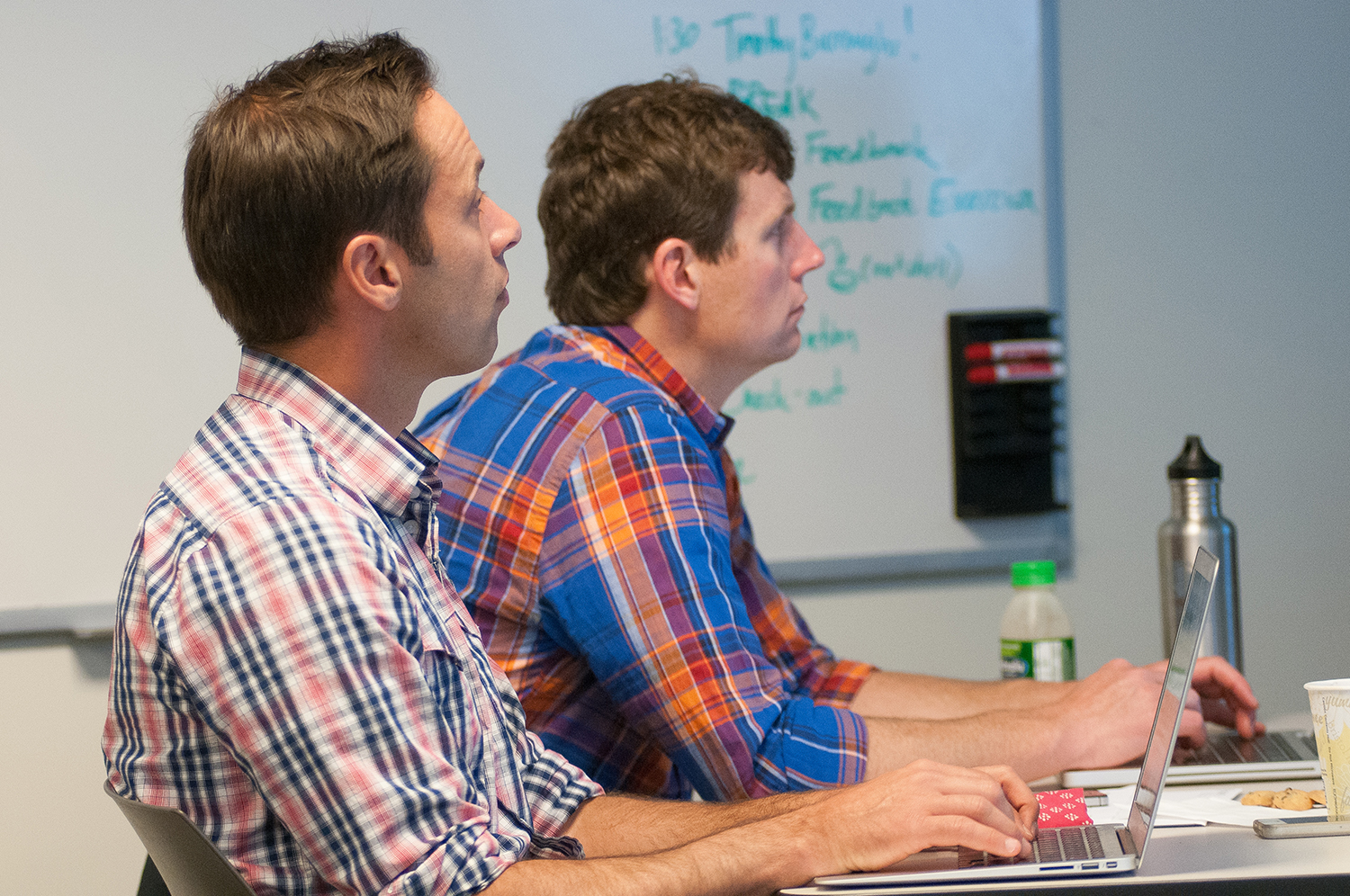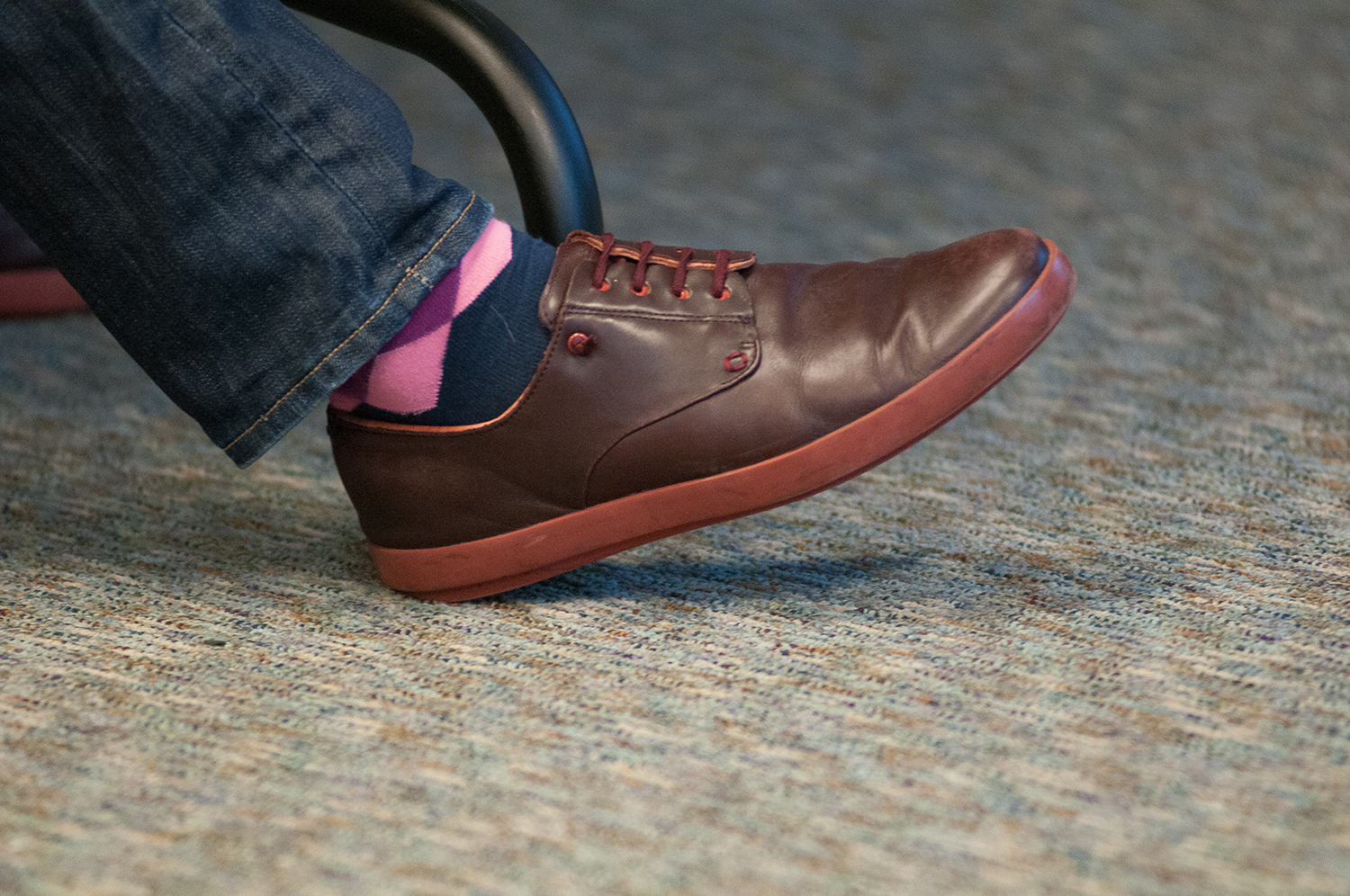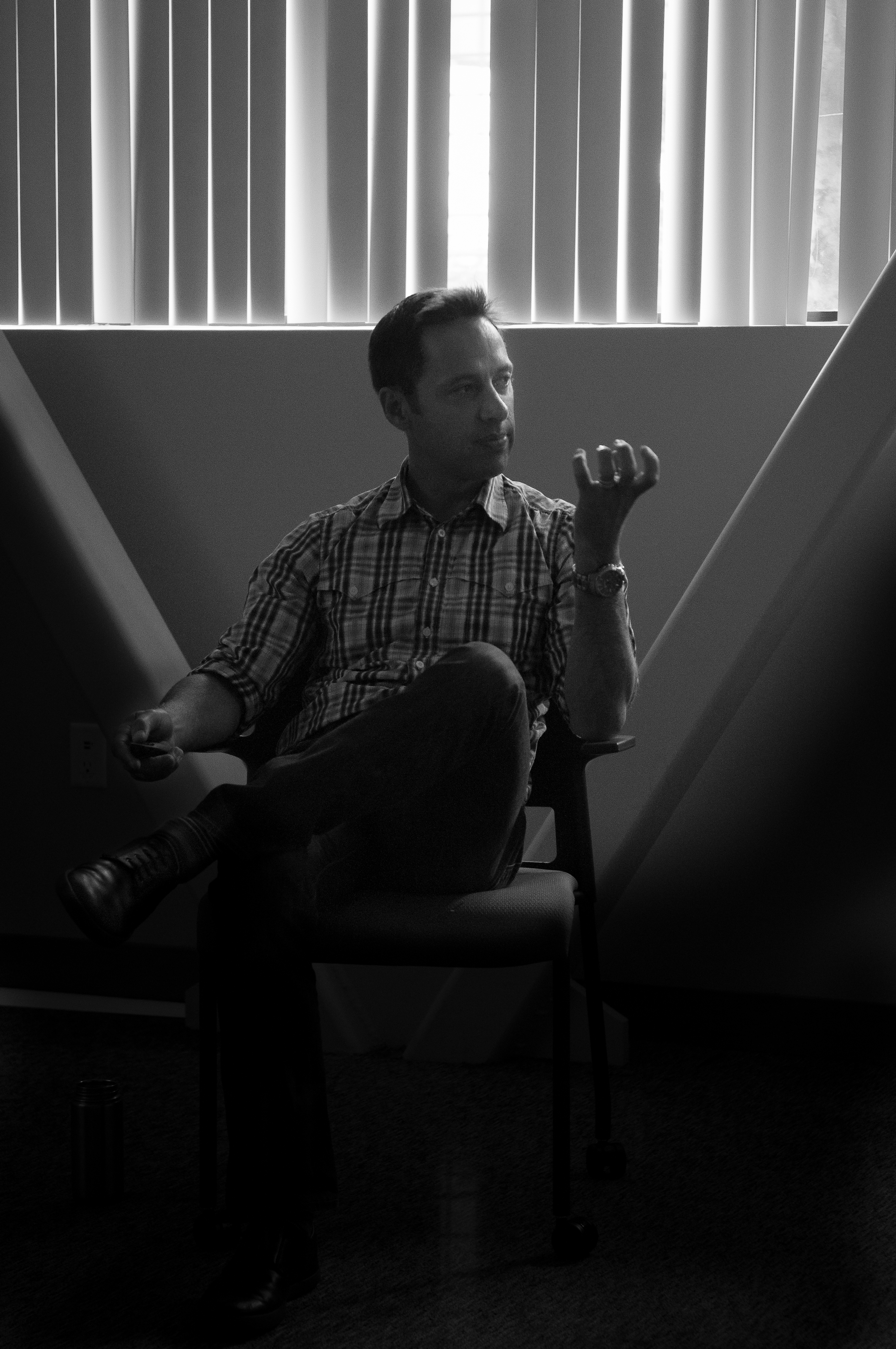 Ever seen a pair become so in sync they start to dress alike? With matching plaid shirts and stylish kicks, PGS professors Carl Schneebeck (C7) and Nils Moe (C3) have an uncanny ability to look, speak and communicate with a flow that rivals the most polished cinematic duos. But the “MoeBeck look” isn’t how these guys got named 2013-2014 Fred Gellert Family Foundation Faculty.
Ever seen a pair become so in sync they start to dress alike? With matching plaid shirts and stylish kicks, PGS professors Carl Schneebeck (C7) and Nils Moe (C3) have an uncanny ability to look, speak and communicate with a flow that rivals the most polished cinematic duos. But the “MoeBeck look” isn’t how these guys got named 2013-2014 Fred Gellert Family Foundation Faculty.
Their wickedly-effective communications course, Effective Management, Communication and Action (EMCA), receives consistent high praise from students and staff alike. Both Carl and Nils exemplify the term “scholar-practitioner” — whether it’s Carl teaching newly minted managers skills beyond their technical backgrounds via his Compassionate Leadership Forum, or Nils directing the Urban Sustainability Directors Network (USDN)’s vast community of municipal leaders in collaborating towards a more sustainable future. I sat down over a greasy lunch with both of them to chew the fat about their trademark style, substance, and sustainability visions.
 RM: You’ve both become mentors to many Presidians through your teaching. Who are the people who have most influenced and mentored you in the past?
RM: You’ve both become mentors to many Presidians through your teaching. Who are the people who have most influenced and mentored you in the past?
CARL: Bob Dunham and Donna Montgomery were real eye-openers for me. Bob is one of the great thought leaders in the space and led me to question my assumptions about communication in our community, and Donna made communication tangible to me as I got involved in the sustainability movement. Cynthia Scott, another Presidio professor, has been a mentor and partner in developing the curriculum that I use today.
NILS: My former boss, [City of Berkeley] Mayor [Tom] Bates, for walking the talk. A pure orator and relationship builder. He’s been doing it for 40 plus years. The way he can relate to others, weave his story into any context, and make people feel at ease, was really powerful to see.
 RM: You’re both PGS MBA graduates. How did you land at PGS?
RM: You’re both PGS MBA graduates. How did you land at PGS?
CARL: When I was looking at potential business schools, it was recommended that I talk with Nils. We met at school.
NILS: I take full responsibility for Carl entering the PGS world. (laughs) I remember you as that guy with the crazy last name.
CARL: I was frustrated working with—and sometimes against—businesses in the non-profit world. It led me to seek ways to improve my communication skills. I originally applied to and was accepted by several “traditional” business schools but Presidio proved more compelling due to the people I met during my due diligence. These are the people who understand where I’m coming from, that my goal is not just to learn business for the sake of learning business, but that there is a greater calling. As soon as I saw the DNA of the people that make up the institution, I felt the community and the network I would build and make here would be much more aligned with what I wanted to do.
NILS: Turning towards an MBA made sense in my trajectory. I had started non-profits but I didn’t have a lot of business acumen. I was also accepted to a more traditional, different MBA program that led to a potential fellowship, but I had a revelation that I may be in a spot that didn’t feel right, so I started looking elsewhere. That’s where I found PGS.
RM: How has EMCA evolved since you’ve been at the helm?
NILS: We tweak the course a little each semester, and try to incorporate student ideas and feedback. The pillars remain similar. We’ve built upon the foundation set by current and former faculty, such as: Bob Dunham, Gayle Yamauchi, Katherine Towers-Kaminski, Donna Montgomery, Cynthia Scott, Jessica Williams, Rob Coombs, and Chelsea Souter. All have added and infused ideas and thoughtfulness into the curriculum. To credit us with the way the class is taught would be a disservice to the network and evolution that created it. In many ways we are the delivery system for a lot of ideas that others have brought.
CARL: The intention is to honor, understand and organize the foundational knowledge essential to what we are trying to teach in class, while being open to what is new and relevant to students. As quickly as the world—and the world of sustainability—changes, we have to be nimble to recognize the challenges and needs students will have, today and in the future. With Nils being as involved in the field as he is, it is super helpful in terms of understanding the challenges and the things we need to work on. And we address those challenges with theories, literature, tools, and everything we can bring into the course.
RM: Do you feel you can discern the nuances and skills of a great speaker, or is there still a bit of “magic” in it for you?
NILS: I’ve become more of a communication geek. I’ve learned to appreciate good communication. I am consistently inspired.
CARL: Often in the organizations I’ve worked in, I’ve been the de-facto communications person, working with people to help smooth over relationships that have become toxic. Part of what I enjoy about teaching is being able to give a better name to these skills and to appreciate how challenging it is for others. I have empathy for people for whom this isn’t second nature and I’m trying to help them find ways to build those skills.
RM: How would you answer the question: Is it simply innate or can you learn to be a better public speaker?
CARL: When you see a master like Tom Bates or Bob Willard, who can handle challenging situations in really nimble and inspiring ways, it’s clear that some of those instincts come naturally. But they have also brought intention to their work. Good communicators work toward a problem with intention.
There’s a level of improv in EMCA. It’s one of the things that allows a student to push the boundaries and be okay with failing. I grew up taking improv classes for fun. The principles of improv—accepting what people say and building on it—are essential business communication skills. At PGS people are generally very supportive and appreciative of the risks and failures in class that surround presenting. As they say, the show must go on.
NILS: Improv classes scare the $%!* out of me! (laughs) But that’s what draws me to the class and Carl’s contributions to our class. Not only is it wickedly fun but wickedly helpful. But I realize it draws people to the class and helps with the learning. I appreciate the fear and emotions that surround the class. The psychology behind getting to know yourself, and feeling empathy for others, especially when others are having a tough time or are nervous in front of the class. That’s what this is all about. It’s important to create that psychological safety net to help them succeed. I still get nervous. Every time. I’ve just learned to channel it and use it for good.
RM: What do you think is communicated well and what’s a big miss in the business of sustainability?
CARL: Unfortunately it’s ugly. Very little is communicated well. Most things are communicated poorly. A void exists where sustainability is concerned.
NILS: I’ve just come back from a conference of sustainability leaders from across America. There is no lack of thought leadership, action or implementation. Where the real vacuum lies is in disseminating these stories, and creating a narrative that lets people know about these great projects that are happening. And we need help. A lot of help.
CARL: I get the sense that we tend to discount how important individual conversations can contribute to measurable change. These things go viral not because some institution or entity comes up with a really good plan…but because people get better at telling compelling stories, and inspiring other people to do good things. Sometimes we are so myopically focused on the underlying point that we forget how the message is coming across and what emotional touch points it’s hitting.
We can’t wish people to care about things they don’t care about. We have to work with people to create a narrative and get to a better place. That’s the secret sauce. Pushing your agenda without thinking about your audience is a deadly sin of communication.
RM: Nils, tell me more about USDN and your new role as Managing Director.
NILS: USDN is a virtual organization with members and staff distributed across the US and Canada. We meet in person for several days at least once a year, but the rest of our interactions are done online or via phone calls. One of the interesting organizational challenges within USDN is how we can effectively come together and host open discussions on a regular basis. We traditionally do this through all-member monthly webinars and bi-weekly smaller team work group calls.
These virtual hangouts have helped to maintain our connection, but recently we have rolled out two experimental approaches that seem to be working very well. We are funding what we call “Breakthrough Convenings” and “Peer to Peer Exchanges.” We offer members the opportunity to organize gatherings of multiple cities who are working on cracking the code on common pain points.
For example, we recently hosted a breakthrough convening of the early adopter cities for energy disclosure policies. Peer to peer exchanges allows one city to visit with a host city who may be further along on a certain issue. It allows the visiting city to see the policy in action and take the learning back to their home base. I guess you could say, much like PGS, we created a hybrid learning environment within USDN.
RM: Carl, you’re efforts behind the Compassionate Leadership Forum have enhanced the communication and leadership skills with many outside the Presidio classroom. How do you measure your success?
CARL: I measure my success in the small practices I give my clients to help them completely change the way they work. The greatest satisfaction I get out of coaching is having a follow-up call where they share their success and insights about the changes they have made in their own behavior. If I play a small part in helping someone show up to work with greater intention, authenticity, and presence, it not only helps them and their organization, but it makes me immensely happy.
I credit a lot of what I know and continue to learn and practice to the education I received at PGS as well as the experience I’ve gained from teaching and working at the school.
RM: What do you guys follow to keep current in this space?
NILS: Of course, I follow the PGS community! In addition, I find the USDN.org to be a rich source of trusted information. I also follow Todd Woody, a former environmental editor for Forbes, currently writing for The Atlantic. He’s a thought leader with lots of integrity.
CARL: Much of my information intake comes not from direct sustainability world sources, but through the lens of organizational effectiveness. I also rely on Facebook posts and viral media, The New York Times and The New Yorker. I usually have about 5-10 books I’m working through, some are relevant and some not. For sustainability, I like both Triple Pundit and Grist.
RM: Last thought. Any moments that exemplify either breakthrough clarity…or a major fail?
NILS: My wedding weekend, at the rehearsal dinner. I gave a speech that I thought was really awesome, and then at the end of the speech I called my future father-in-law by the wrong name. That wasn’t so hot. But he forgave me.
CARL: At least you didn’t call your wife by the wrong name!?!
RM: Thank you gentlemen. It’s been a true pleasure!
This article was originally published in Presidian Spring 2014: Theory to Action. Read more from the interactive online magazine here!
